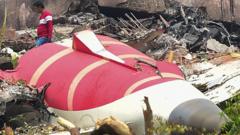Following the devastating Air India flight crash, authorities are deliberating whether to send the aircraft's black boxes abroad for expert analysis, while concerns over the data recovery and aircraft safety checks grow.
India Considers Overseas Analysis of Air India Crash Flight Recorders

India Considers Overseas Analysis of Air India Crash Flight Recorders
India's Aircraft Accident Investigation Bureau weighs options for the black box analysis of last week's tragic Air India crash, which claimed over 270 lives.
India's Aircraft Accident Investigation Bureau (AAIB) is currently assessing whether to send flight data and cockpit voice recorders from the Air India flight that tragically crashed on Thursday to an overseas facility for decoding and analysis. The accident resulted in the deaths of at least 270 individuals, primarily passengers, when the London-bound Boeing 787-8 Dreamliner went down shortly after takeoff from Ahmedabad airport in western India.
Despite initial reports suggesting that the black boxes would be dispatched abroad, the ministry of civil aviation has clarified that no definitive decision has yet been reached. The AAIB is expected to evaluate various technical, safety, and security factors before determining the analysis location for the flight data.
Investigators successfully recovered both sets of Enhanced Airborne Flight Recorders (EAFRs) from the crash site, each capturing critical data regarding flight performance. These "black boxes" are essential for reconstructing the flight's final moments and uncovering the cause of the devastating incident. However, there are concerns regarding the condition of the recorders following a significant fire that occurred after the crash, complicating potential data extraction in India. Speculation surrounds a possible plan to send the recorders to the U.S. for thorough examination.
Former AAIB investigator Captain Kishore Chinta mentioned that one set of recorders may be sent to the U.S. for comparison with data analyzed in India and to provide insights to the National Transportation Safety Board (NTSB). Although the newly inaugurated AAIB lab in Delhi aims to facilitate EAFR data downloads, its operational capacity remains uncertain.
In the meantime, Air India's chairman, N Chandrasekaran, disclosed that one of the engines on the crashed aircraft was newly purchased, while the other was not scheduled for servicing until December. He assured that both engines had "clean" histories. Following the incident, India's aviation regulator mandated additional safety inspections for Air India's Boeing 787 fleet to ensure passenger safety.
On Thursday, Air India announced reductions in flights across 16 international routes and the suspension of services to three overseas destinations from June 21 to July 15. These adjustments are a proactive measure to conduct enhanced pre-flight checks and to manage extended flight durations resulting from airspace restrictions in the Middle East.






















